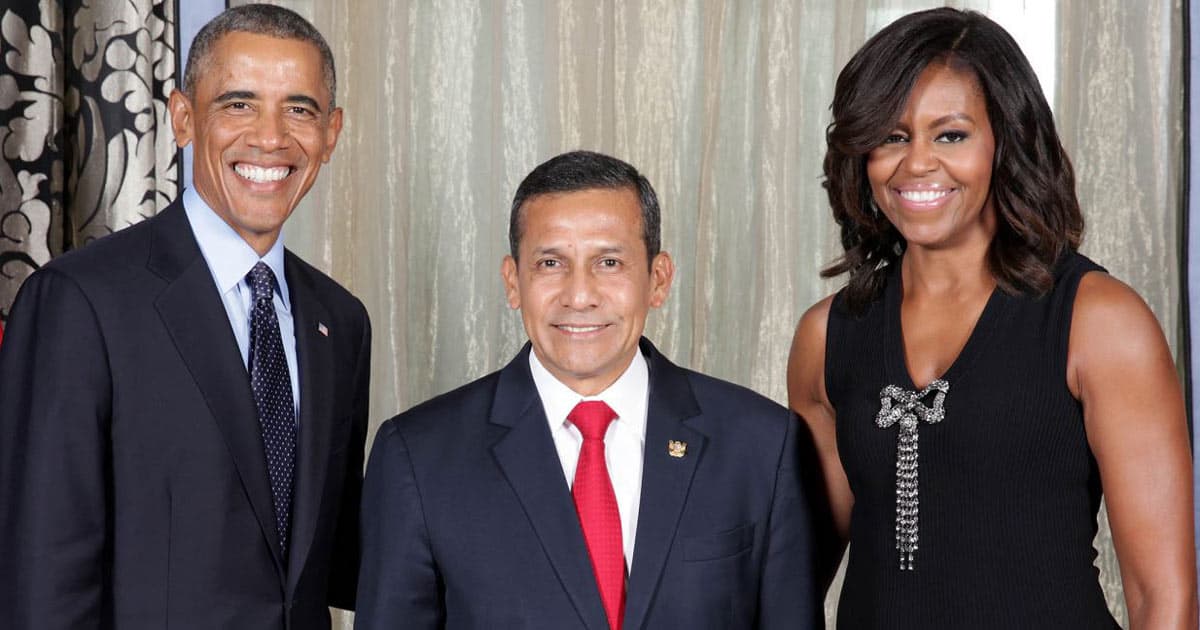Peru’s left-wing former President Ollanta Humala has been sentenced to 15 years in prison after being found guilty of money laundering involving illicit campaign funds.
Humala’s wife, Nadine Heredia, faced the same verdict but has found refuge in Brazil.
The sentencing marks the culmination of a turbulent chapter involving one of Peru’s former leadership teams embroiled in financial scandals and political turmoil.
The court in Lima deemed Humala guilty of accepting illegal funds for his 2006 and 2011 election campaigns.
The money reportedly came from ex-Venezuelan President Hugo Chávez and the Brazilian construction giant Odebrecht.
The judge handed down the 15-year sentence after a decisive legal battle that put Humala’s political career under intense scrutiny.
Nadine Heredia, a significant figure in her own right, was also found guilty of laundering money.
Before her arrest warrant could be carried out, Heredia, accompanied by the couple’s son, sought asylum at the Brazilian embassy.
Taking refuge at the embassy, she negotiated safe passage to Brazil, where her request for asylum was granted.
As Humala was sent off to Barbadillo prison on Thursday, he joined the ranks of other Peruvian presidents ensnared in corruption scandals.
Barbadillo has also housed former leaders such as Alejandro Toledo and Pedro Castillo. This location has become synonymous with political turmoil in Peru, highlighting the country’s ongoing struggle with corruption.
Toledo received over 20 years of incarceration for accepting bribes from Odebrecht, a company infamous for its widespread bribery practices.
Meanwhile, former President Alan García tragically ended his life in 2019 amid an impending arrest regarding the same scandal.
Another former president, Pedro Pablo Kuczynski, faced impeachment over Odebrecht payments, which he defended as legal.
The charges against the couple detailed accusations of accepting $3 million from Odebrecht for Humala’s 2011 campaign.
For the previous 2006 campaign, they allegedly received $200,000 from Chávez.
The prosecution argued that these funds unfairly bolstered Humala’s political campaigns, undermining the electoral process.
Following the Odebrecht revelations, Humala’s legal troubles have dogged him since his presidential term ended in 2016.
The Brazilian company’s admission to global bribery practices spurred legal actions against numerous political figures worldwide, including in Peru.
Humala’s journey to the presidency is marked by pivotal moments in Peruvian politics.
He first captured the public’s attention in 2000, participating in a rebellion against then-leader Alberto Fujimori.
His political ambitions led him to run for the presidency in 2006, in which he lost to Alan García after campaigning against Venezuela-style governance.
Humala’s efforts to reshape his political image paid off when he won the election in 2011, choosing a platform that mirrored Brazil’s far-left President Luiz Inácio Lula da Silva.
Wilfredo Pedraza, Humala’s attorney, criticized the 15-year sentence as being disproportionately severe.
Humala and Heredia have consistently maintained their innocence, denouncing the charges as motivated by political vendettas.
This stance reflects a broader narrative in Peruvian politics, where several leaders have faced accusations and convictions.
The line between legitimate governance and corruption often appears blurred.
The pervasive influence of the Odebrecht scandal continues to shape the political landscape of Peru.
Humala stands as the first of four presidents implicated in the legal fallout from their dealings with the construction conglomerate.
The investigation has resulted in legal action across South America against numerous officials.
Despite the conviction, the couple has maintained a narrative of political persecution.
Humala, who initially warned against Peru adopting Venezuela-like policies, now finds himself enmeshed in controversies partially fed by the same regional politics he once cautioned against.
In the coming months, Heredia will reside in Brazil, having reached São Paulo after her arrival in Brasília.
The legal proceedings in Peru, however, continue to spotlight the challenges faced by the country’s justice system as it navigates the divide between past government actions and the public’s trust.
The saga serves as a reminder of the complex interplay between political ambition and ethical governance.
In Peru, the judiciary’s decisions symbolize the nation’s broader reckoning with corruption, demanding accountability from public figures.
This case and its implications will undoubtedly shape the political discourse in Peru as citizens call for transparency.
Humala’s legacy, much like those of his predecessors, remains intertwined with political controversy.
READ MORE – Brazil’s Ex-President Jair Bolsonaro Recovering from Bowel Surgery After Stabbing

Our comment section is restricted to members of the Slay News community only.
To join, create a free account HERE.
If you are already a member, log in HERE.